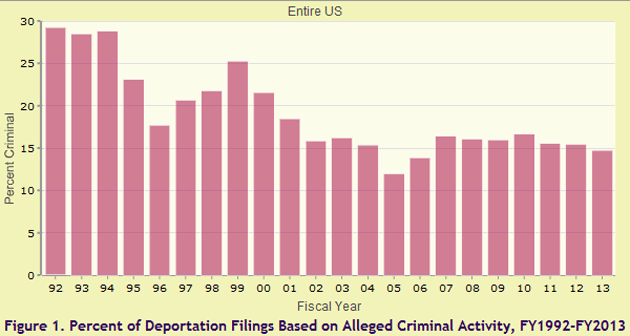
Percentage of all deportation filings related to criminal activity<a href="http://trac.syr.edu/">Courtesy of Transactional Records Access Clearinghouse</a>
In August 2011, the Obama administration announced that it would no longer devote the scarce resources of the federal government to deporting undocumented immigrants whose only real crime was entering the US to find a job. Instead, the administration promised smarter enforcement, focused primarily on criminal aliens. “It makes no sense to spend our enforcement resources on these low-priority cases when they could be used with more impact on others, including individuals who have been convicted of serious crimes,” wrote Cecilia Munoz, the administration’s director of intergovernmental affairs, in a White House blog post. “This means more immigration enforcement pressure where it counts the most, and less where it doesn’t.”
Fast forward two years. New data crunched by the Transactional Records Access Clearinghouse (TRAC) at Syracuse University, which uses the federal Freedom of Information Act to collect massive amounts of federal records, shows that little has changed since the administration announced the change in policy. In the current fiscal year, through June, only 14.7 percent of deportation filings have been related to criminal activity. Most of the rest have been for garden variety immigration offenses. TRAC points out that this is slightly worse than in the last year of the Bush administration, when 16 percent of deportation filings were criminal-related. And it’s far different from what was going on in 1992, when nearly 30 percent of deportation filings involved allegations of criminal activity. Of course, back then, the US was deporting far fewer people, just shy of 90,000 compared with more than 212,000 in 2012. Even so, the alleged criminals make up a pretty small percentage of the deportation docket.
The numbers vary radically by state, too. Out of the 700 deportation filings from Tennessee, only 11 were for alleged criminals. But in Hawaii, where 108 people were hit with deportation filings this year, 51 were alleged criminals, nearly 50 percent and the best record in the country for focusing primarily on criminal aliens.
TRAC’s numbers, taken from official federal data, have consistently undermined the president’s assertions that he’s trying to ease up on Latino communities by focusing only on criminals and not all the other immigrants in this country. The administration has insisted that past TRAC reports on this issue are wrong because they don’t have all the information on the criminal cases at the root of some of the deportations. TRAC, though, has asked the administration for more data, and the administration hasn’t been forthcoming.
The new immigration numbers offer one other interesting data point: Thirty-one people supposedly have been slated to be deported for terrorism or national security reasons this year. The vast majority of them were Cubans, Mexicans, or other Central Americans. Perhaps TRAC, or the Immigration and Customs Enforcement agency, need some other way of categorizing these people, because it’s really hard to believe that they’re all alleged terrorists. After all, only Rep. Louie Gohmert (R-Texas) believes Al Qaeda has a big Mexican affiliate, and none of the people captured and identified as real potential terrorists are going anywhere, much less back home.













